‘The Dutch are fighting in Uruzgan primarily for their own safety'
‘The Dutch are fighting in Uruzgan primarily for their own safety'
Recently SP Member of Parliament Remi Poppe visited Afghanistan on a week-long fact-finding mission. It was, Poppe says, an impressive if depressing journey. "Our boys and girls are doing their best, but there's hardly any sign of reconstruction and they are fighting primarily to guarantee the safety of their own bases." Below is a report of Remi Poppe's experiences in the war-torn country.
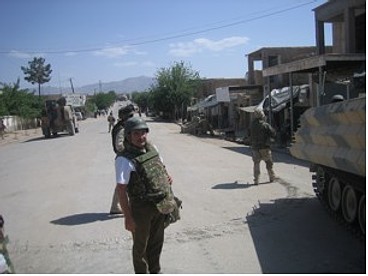
“You can only walk around the streets in Uruzgan in a bulletproof jacket and wearing a helmet. The local population were kept away from us.”
This is a war zone. This is the only conclusion that I can draw following my visits to the International Security Assistance Force (ISAF) bases in Kabul and Kandahar and of course to the Dutch encampments in Uruzgan. I and several other MPs spoke there with commanders, ordinary soldiers, Afghan MPs, and officials. What had seemed destined to happen was an unequal struggle between armies with the most modern weapon arsenals against 'men in sandals'. But it turns out nevertheless to be a struggle which cannot be won, and a completely senseless war. "As soon as they're gone they're back" was one of the remarks which I heard regularly from soldiers. The lessons which the Americans learned in Vietnam and the Russians in Afghanistan must clearly be learned all over again.
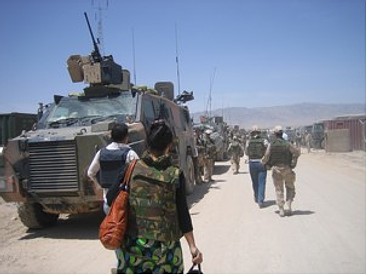
“We move around primarily in armoured cars, known as Bushmasters.”
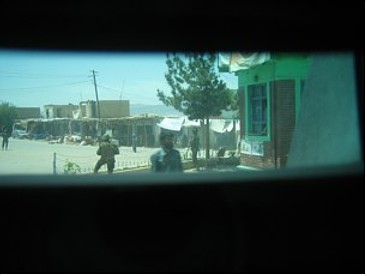
"You don't see much of the Afghan villages from an armoured car."
From talks with those involved I surmise that the most fanatical ten percent of the fundamentalist Taliban in Afghanistan originate in Afghanistan and that they are not what you'd call nice lads. The rest, 90 percent of the Taliban – also known as 'rebels' – are, however, products of the local population. The war by means of which Afghanistan was 'conquered', the continual shootings and bombings carried out by foreign soldiers and involving civilian victims, the destruction of the Afghan people's frugal housing, all make it easier for the Taliban to recruit.
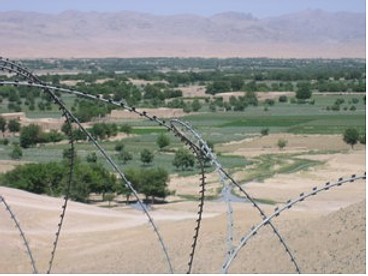
View from a camp over the poppy fields in the valley.
Nevertheless the fact is that our soldiers, from the highest-ranked to the lowest, are doing their best to carry out the tasks assigned to them by the government. The most effort, however, as well as heavy munitions, are actually being put into guaranteeing the security of our own people. Talking with ordinary soldiers I heard repeatedly that they were mainly occupied with simple 'survival'. The officers and enlisted men and women who are responsible for reconstruction are divided between the Provincial Reconstruction Team (PRT), working on the construction of roads, schools, water works and so on, and the Operational Monitoring and Liaison Team (OMLT), which is assisting in the formation of an Afghan National Army (ANA). The training of police was also a task of the OMLT, but it recently became a European affair under the name Eupol, so that's where the Dutch personnel are now operating.
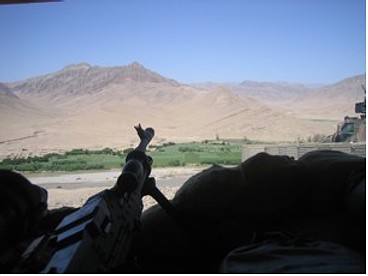
“View from a camp over the barrel of a machine gun."
The Afghan army and police will be charged, after NATO leaves the country, with guaranteeing democracy in Afghanistan. There seems no prospect of their being able to do so in the short term. Hundreds of Afghan soldiers in Uruzgan turn out to be far less trained and available than the government would have us believe. After the monthly payment of allowances, they tend to go home in order to deliver their money, there being no banking system through which they can transfer their pay. On average, two hundred don't come back. The ANA in Uruzgan has only a small number of ordinary pickup trucks with a machine gun mounted on the cab and soldiers equipped with Kalashnikovs and grenade-throwers. The development of a police force is going no better than this, moreover.
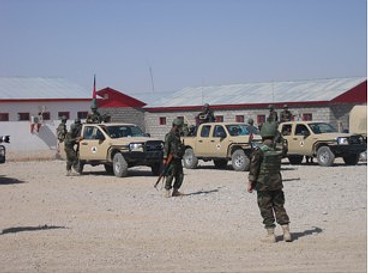
“Soldiers of the Afghan National Army”
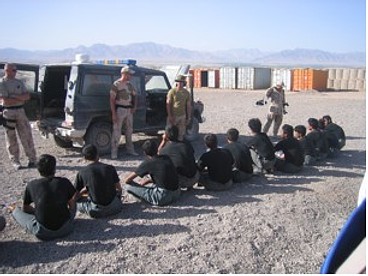
A police training session
The situation in Afghanistan is particularly complicated by the tribal relations in the country. Tribal chiefs, whom our soldiers tend to call 'robber chiefs', defend their own interests in the provinces, in parliament and in the government of President Karzai. The Netherlands had major problems with the last district chief, Jan Mohammed, so he was replaced. But because of the tribal structure his power was not broken by this. We hear that recently a ‘jirga’ (a meeting of local tribal leaders) was held at which Jan Mohammed arrived and immediately assumed the leadership. A short time ago there was an uprising against the district chief whom the Netherlands wanted to see in power. Reconstruction will unavoidably be coupled with involvement in local tribal politics, which only the Afghans themselves understand. In short, we have to deal with a centuries-old local tribal culture within which we'd be better leaving our 'standards and values' out of things.
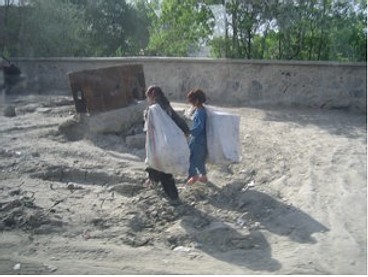
"Afghan children on their way to school?"
The soldiers from the PRT, OMLT and Eupol are also doing their best, but comparisons between the overwhelming presence of combat troops and that of a handful of reconstruction workers don't add up. the latter is no more than a fringe compared to the whole of the Dutch stake in Uruzgan, a presence which is costing a total of €800,000 per day!
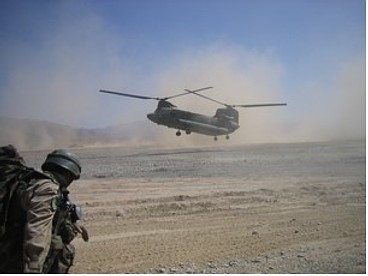
“Landing of a Chinook helicopter at patrol base Coyote”
According to the government we should not confuse the US-British war machine in Afghanistan, Operation Enduring Freedom (OEF), with the NATO reconstruction mission ISAF. But in the military camps where we stayed, I found it impossible to distinguish the two. At the airports of Kabul and Kandahar – enormous military encampments – there was an overwhelmingly large collection of the most modern weapons systems, fighter planes and transport planes together, as well as soldiers from every corner of the western world, most of them from the US. In Uruzgan the Netherlands has six F-16 warplanes, a number of Apache helicopters and two examples of the heaviest artillery that we have, armoured howitzers. When you're talking about the use of these battle planes, the distinction between the ‘War on Terror’, or the OEF is impossible to make, let alone for the rural Afghan population.
Of course all official briefings that we receive are soaked through with positive messages by senior officers who tell us of the progress being made. The people feel safer and cooperation with ANA is improving all the time, is what we're told. The more or less informal conversations we had with officers and ordinary soldiers told a different story, however. I was able to note down phrases like "senseless mission" many times. The question as to where the United Nations was up to with the reconstruction plans, which you should note that I put directly to the officers responsible for reconstruction, also revealed that they were not completely certain of the mission's usefulness. I can in any case conclude that the Dutch military mission is not the way to help the people of Uruzgan to be assured of a better level of local security or a better future.
- See also:
- Afghanistan
